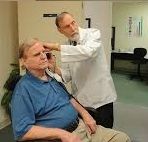
Hearing Loss and Aural Rehabilitation
Yes, those with hearing loss also need rehabilitation – Aural Rehabilitation that is.
It begins with people understanding their hearing loss and what it means for their lives. It is about learning how to prevent further loss and how hearing technology and assistive listening devices (ALDs) can help make the most of the hearing that is left. It is about understanding the details of the instruments that are recommended. It is about getting skills for dealing with the communication issues and with the social, emotional and professional challenges related to hearing loss. Mostly, it is about learning how to incorporate hearing loss successfully into daily life.
In the “rehab” process, people gain knowledge and confidence, which make it easier for them to adjust to the many new realities that hearing loss bestows on them. Instead of fighting change, they work with it. And so, it can be said that “Aural Rehabilitation,” is a comprehensive, patient-centered Care Plan that comes with the treatment of hearing loss. This is at least the ideal situation.
The reality of Aural Rehabilitation
How much of this type of care do people actually get when they go in search of hearing help? It all depends. My early-on contacts with specialists produced little information and few answers, which led to plenty of frustration on my part. I was totally new to hearing loss, uninformed and overwhelmed. Motivated and eager to learn, I was actually an ideal Aural Rehabilitation poster case. But that was not to be and my situation is not unique.
Eventually, I moved on. However, I learned that one should not be satisfied with information rationing and with interactions that focus almost exclusively on the the sale of hearing instruments and discussions of prices and warranty details.
Importance of teamwork
Depending on the complexity of the case, Aural Rehab teams can involve a variety of specialists such as psychologists, doctors, audiologists and speech therapists. In general, however, the “team” consists of the patient and the hearing specialist with maybe a friend attending for extra support.
Involve your specialist by showing interest in your care. Consider him/her your ally and build a working relationship. Use your appointment times wisely. Come prepared with questions and concerns. Bring a friend to help you listen and to maybe take notes.
In the end, do you feel valued by the care provider? Do you get answers to your issues? Do you understand your hearing loss? Are your communication needs met? Are you gaining skills for living and working with the challenges of hearing loss?
Indeed, treating hearing loss goes beyond hearing technology. It involves an Aural Rehabilitation plan that addresses the hearing and communication issues as well as with the many social and emotional challenges related to hearing loss. Simply put, treating hearing loss is an involved Aural Rehab team effort.
****
For industry Safety Training on Noise-induced Hearing Loss Prevention or for community presentations, please see my website or email monique.hearing@gmail.com
To learn about ears and hearing, please see my book on hearing loss: What Did You Say? An Unexpected Journey into the World of Hearing Loss, now in its second updated edition. Sharing my story and what I had to learn the hard way.